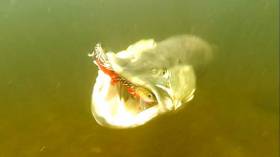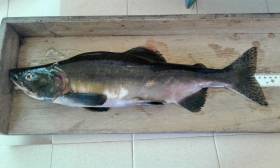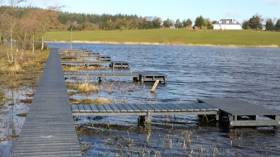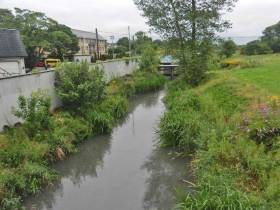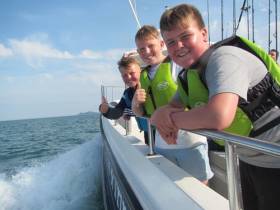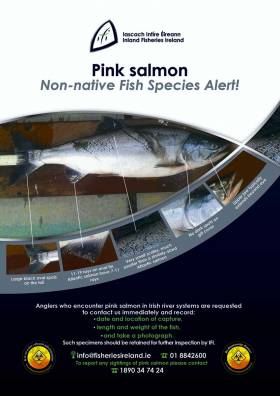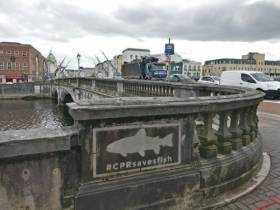Displaying items by tag: Inland Fisheries Ireland
Connacht Anglers Fear Threat To Wild Brown Trout By ‘Predator’ Pike
#Angling - Wild brown trout in Connacht lakes face extinction due to unchecked numbers of pike, local anglers fear.
According to Galway Bay FM, the Connacht Angling Council says stocks in Lough Corrib and Lough Mask are among those under threat unless measures such as a closed season for angling and a pike cull are introduced.
Ahead of its ‘Pike are Predators – Save our Wild Brown Trout’ campaign launch this Wednesday 20 September from 8pm at the Boat Inn in Oughterard, the council has launched an online petition in the hopes of persuading Inland Fisheries Ireland to take action against the “predator” species.
Rise In Fish Kills Recorded In EPA Water Quality Report Disappointing Says Fisheries Agency
#FishKill - Inland Fisheries Ireland (IFI) has expressed disappointment at the findings of the Environmental Protection Agency (EPA)’s water quality review.
According to the EPA report, published yesterday (Thursday 31 August), the total number of reported fish kills in 2013–2015 was 97 — an increase in fish kills compared to 2007–2009 and 2010–2012.
In several instances of fish kills, the exact cause was unknown and several influences may have played a part.
IFI has cautioned against singling out any particular sector for the standard in water quality across Ireland’s river basins and lakes, backing the EPA’s findings that “multiple factors” are at play.
“There were 31 separate fish kills across the country last year, but just eight of those were directly attributable to agricultural activities,” said IFI chief executive Dr Ciaran Byrne.
“Inland Fisheries Ireland is grateful to the farming community for their continued consideration and vigilance. Good farmyard management can help to prevent accidental runs of polluting substances and protect the local environment.”
In addition to the agricultural-related kills, two fish kills were as a result of municipal works and one by industrial works.
In four instances, the exact cause of the fish kill was difficult to ascertain while 16 incidents of fish kills were as a result of disease and natural causes.
IFI carried out over 22,000 environmental inspections in 2016 across industrial, forestry, engineering, water treatment, farmyards and wind farms sites to help identify any risks and prevent damage to the local aquatic habitat.
“From an ecological and angling tourism perspective, our rivers and lakes are vital national resources,” said Dr Byrne. “It is essential that we protect and conserve these assets and water quality has a significant impact on fisheries habitats and populations.”
Heightened Alert Over Non-Native Pink Salmon In Irish River Systems
#PinkSalmon - Inland Fisheries Ireland (IFI) has appealed to anglers and the general public to remain vigilant and report the presence of any Pacific pink salmon in Irish river systems.
To date, 30 pink salmon have been recorded in nine Irish rivers since the first catch was reported on 27 June from the Galway Weir fishery.
One of the most recent captures of pink salmon was a mature male ready to spawn on the River Erriff in Co Mayo.
This fish was caught on 9 August in Ireland’s National Salmonid Index Catchment, where a wide range of scientific research and monitoring activities on resident salmonid populations is undertaken.
Catches of pink salmon have also been reported on rivers including the Foxford Fishery in Co Mayo, the Coolcronan Fishery on the River Moy, the Galway Fishery on the River Corrib, the Cong River on the River Corrib and the Drowes and Crana Rivers in Donegal.
The most recent catch was on the Owengarve River in Mayo on 10 August.
As previously reported on Afloat.ie, pink (or humpback) salmon are a migratory species of salmon, native to river systems in the northern Pacific Ocean and nearby regions of the Bering Sea and Arctic Ocean.
The species also has established populations in rivers in northern Norway and in the far northwest of Russia, originating from stocking programmes undertaken in this part of Russia.
In Ireland, there is no licence to farm Pacific pink salmon. The appearance of the species is of concern to IFI as it may impact Ireland’s indigenous Atlantic salmon populations in the future.
The potential impact of pink salmon is unclear at present but these fish may introduce parasites and pathogens not present in native salmonid fish.
Interbreeding with Atlantic salmon is unlikely as pink salmon spawn in late summer whereas Atlantic salmon spawn in winter. However, competition for food and space in nursery areas between juvenile pink and Atlantic salmon is possible.
IFI is appealing to anglers to report catches of pink salmon to Inland Fisheries Ireland’s 24 hour confidential hotline number (1890 34 74 24 or 1890 FISH 24). As these fish die after spawning, some dead specimens could also be encountered along Irish rivers.
Anyone who catches a pink salmon is asked to:
- Keep the fish and do not release it back into the water (even in rivers only open for catch and release angling).
- Record the date & location of capture, length and weight of fish.
- Tag the fish and present it to IFI and a new tag will be issued to replace the tag used.
- Take a photograph of the fish.
- Report it to IFI’s 24-hour confidential hotline without delay.
Collection of the fish will then be arranged for further examination. This will help establish the abundance and extent of distribution of the species in Irish waters.
IFI has also developed a Pink Salmon Factsheet and Identification Flyer to help anglers identify the fish.
#Angling - Sean Kyne TD, Minister of State with responsibility for Inland Fisheries, has today (Wednesday 9 August) welcomed a new €2 million funding call from Inland Fisheries Ireland (IFI) for angling projects and conservation initiatives.
The funding call, which consists of three separate funding streams, will help ensure that Ireland’s fish stocks and angling infrastructure are protected and enhanced into the future.
The 2017 IFI funding call is made up of the following funds:
- Salmon Conservation Fund to a maximum of €500,000
- Midland Fisheries Fund of €50,000
- National Strategy for Angling Development Fund (NSAD) €1,500,000
“As minister with responsibility for Inland Fisheries, I have ensured that significant funding under the National Strategy for Angling Development was available from my Department in 2017 to help Inland Fisheries Ireland develop a wide ranging investment initiative,” said Minister Kyne.
“I welcome the fact that the funding programme is rooted in community-led actions and I support Inland Fisheries Ireland in its enhancement plans. I also want to encourage angling bodies, community groups and local authorities to take up the funding opportunity and meet the development challenge at local, regional and national level.”
IFI is inviting applications for funding for projects across a number of areas, from fisheries habitat enhancement and sustainable development works to marketing and promotional projects for angling.
Applications are invited from groups, associations, clubs, local authorities or other appropriate bodies looking to improve Ireland’s fisheries resource.
IFI chief executive Dr Ciaran Byrne said: “Today’s announcement sees Inland Fisheries Ireland make over €2 million available to communities nationwide, for projects which will help contribute to an accessible and sustainable world class inland fisheries and sea angling resource for all.
“We want to ensure that we continue to invest in conservation, while also developing our angling offering in Ireland. While the National Strategy for Angling Development funding stream focuses on improving angling access with a view to attracting more domestic and overseas anglers to the pursuit, the Salmon Conservation Fund and Midland Fisheries Fund re-invest the contributions of anglers into valuable initiatives which a view to promoting the recovery of salmon stocks and habitats and supporting sustainable development works in the Midlands respectively.”
IFI will hold regional information workshops for those interested in applying for funding with a view to giving participants a better understanding of the various funding streams and how they can apply via an online system.
The workshops will take place at the following locations and dates (7pm each date unless otherwise stated):
- Tuesday 29 August - Clonmel Park Hotel, Clonmel, Co Tipperary
- Wednesday 30 August - Castle Hotel, Macroom, Co Cork
- Thursday 31 August - Maldron Hotel, Southern Ring Road, Roxboro, Limerick
- Monday 4 September - CityNorth Hotel, Gormanston, Co Meath
- Tuesday 5 September - Great National Hotel, N26 Dublin Road, Ballina, Co Mayo
- Wednesday 6 September - Menlo Park Hotel, Headford Road, Co Galway
- Tuesday 12 September - Harvey's Point Country Hotel, Lough Eske, Donegal Town
- Thursday 14 September - Athlone Springs Hotel, Monksland, Athlone, Co Roscommon
- Tuesday 19-Thursday 21 September (all day) - National Ploughing Championships, Screggan, Tullamore, Co Offaly
Members of the public who will be attending the workshops are asked to RSVP to [email protected], indicating which workshop they will be going to along with their name and contact details.
The closing date for applications to IFI’s 2017 funding call is Friday 13 October. For more information and to apply, see the IFI website HERE.
Tolka Fish Kill Caused By Tyre Blocking Sewer
#FishKill - A car tyre blocking a sewer led to a major fish kill on the River Tolka in West Dublin this week.
According to TheJournal.ie, as many as 500 fish were killed over a 3km stretch of the waterway between Mulhuddart and Blanchardstown after the blockage caused a manhole cover to overflow into the river.
Local anglers reported the incident to Inland Fisheries Ireland on Tuesday evening (18 July), as RTÉ News reports.
Since then, local angling shop proprietor Derek Talbot has described it as an “absolute disaster” for West Dublin’s angling community.
The Tolka previously suffered an extensive fish kill almost exactly three years ago, affecting thousands of fish downstream from Finglas Road in Glasnevin.
#Angling - Young people from Darndale and Whitechurch in Dublin were among the first groups to get out fishing as part of the Dublin Angling Initiative’s 2017 summer season.
Sphere 17 Youth Services from Darndale in North Dublin took a Fish & Trips charter boat for a few hours of sea angling.
The group spent the evening learning how to fish beside Lambay Island, catching pollock and mackerel — and while fishing they also reported seeing plenty of local birds and seals, as well as wallabies and deer on the island.
The fishing trip was one of six over the past month with the group also enjoying lessons in coarse and game fishing.
Meanwhile, Southside youth group Whitechurch Youth Services were taken to Courtlough Fisheries in Balbriggan where they were coached in bubble and fly fishing for trout. Participants learned about fish handling and catch and release fishing.
In addition to fishing lessons and field trips, Inland Fisheries Ireland’s Dublin Angling Initiative (DAI) has also been attending community events with a view to introducing young people to the fisheries resource in their own locality.
At the recent Chapelizod Community Festival, 16 young people between the ages of 10 and 15 enjoyed an environmental and history lesson on the River Liffey that runs through their community from fisheries staff.
That was followed by a more practical session of sampling and identifying invertebrates, plus an opportunity to examine juvenile trout and salmon taken from the river before being safely released again, as well as a fly fishing lesson.
“Angling is a hobby that can be enjoyed in an urban location such as Dublin at any age or ability,” said DAI co-ordinator Oisin Cahill. “We hope that the young people who participate in the programme and who are introduced to fishing will continue to enjoy it into later life.”
Anyone interested in learning more about the DAI should contact Oisin Cahill at [email protected] — enquiries are welcome from any groups or individuals interested in the programme, and availability will be on a first come, first served basis.
Inland Fisheries Ireland Seeks New Human Resources Head
#Jobs - Inland Fisheries Ireland (IFI) is seeking a Head of Human Resources to be based at its headquarters in Dublin’s Citywest.
Reporting to the CEO, the successful candidate would be responsible for the management and direction of IFI’s Human Resources Division, for the achievement of functional targets and business objectives, and for the strategic development and management of key areas to support IFI in achieving its strategic corporate goals.
This includes management of its human resource assets, and organisational development/optimisation through the identification and implementation of progressive, people-orientated development policies.
This position requires an enabler of change, who will be responsible for the leadership of the strategic HR function within IFI and the implementation of a diverse range of HR programmes.
IFI is looking for a practical and pragmatic HR practitioner with a track record of influencing and operating at a senior level, delivering a professional, results-focused HR service in a unionised environment, combined with experience of negotiating the complexities of transformational change.
The closing date for applications is 5pm on Tuesday 1 August. Full details of the role are available on the IFI website HERE.
#PinkSalmon - Inland Fisheries Ireland (IFI) is appealing to anglers and the public at large to report any catches of pink salmon after number of appearances in recent days.
Catches of the non-native species have been reported on the Foxford Fishery in Co Mayo, the Coolcronan Fishery on the River Moy, the Galway Fishery on the River Corrib, the Cong River on the River Corrib and the Drowes River in Donegal.
The pink salmon, also known as the humpback salmon, originates in the Pacific Ocean where it is the most abundant salmon species.
The migratory species is native to river systems in the northern Pacific and adjacent regions of the Bering Sea and Arctic Ocean.
Outside of its native range, the species has established self-sustaining populations in rivers in northern Norway and in the far northwest of Russia.
These populations are believed to have originated from stocking programmes undertaken since the 1950s. In Ireland, there is no license to farm pink salmon.
The appearance of the species in Ireland is of concern to IFI as it may impact Ireland’s own Atlantic salmon species.
The State agency for Ireland’s inland fisheries and sea angling resources is now appealing to the public to be vigilant and report catches of pink salmon with a view to helping to establish the extent of its distribution in Irish waters.
Pink salmon have a number of unique characteristics which are different to Atlantic salmon:
- Large black oval spots on the tail.
- 11-19 rays on the anal fin.
- Very small scales, much smaller than a similarly-sized Atlantic salmon.
- No dark spots on the gill cover.
- Upper jaw typically extending beyond the eye.
“The appearance of pink salmon in the West of Ireland is currently a mystery to us,” says Dr Greg Forde, head of Operations at Inland Fisheries Ireland. “It seems unlikely that these fish made a migration due to their small size.
“We are appealing to the public, and the angling community in particular, to be vigilant and to report any catch of pink salmon to Inland Fisheries Ireland so that we can undertake examination of size, maturity stage and genetic origin.
“The concern is that when angling, anglers are only exploiting about 15% of the salmon stock so there are likely to be several more of these fish in rivers.”
Reports – which should record the date and location of capture, the length and weight of the fish, and a photograph of the specimen – can be made to IFI’s 24 hour confidential hotline number at 1890 34 74 24 or 1890 FISH 24.
‘CPR’ Saves Fish As New Conservation Campaign Launches
#Angling - CPR saves fish, according to Inland Fisheries Ireland (IFI) at the launch of a new campaign to highlight angling and the importance of conservation.
The hashtag #CPRsavesfish has been placed across a number of bridges and high footfall locations across the country to engage the public around the pursuit of conservation-focused angling.
‘CPR’ stands for ‘catch-photo-release’ and refers to a method of angling where a fish is caught and subsequently returned unharmed back into the water.
This angling technique is proven to contribute to the maintenance of healthy fish stocks and ensures future generations can continue to enjoy the recreational and economic benefits of the fisheries resource.
IFI is supporting catch and release across all types of angling including pike, coarse, salmon and trout fishing as well as sea angling. The method results in positive survival rates for fish when caught using best practise methods.
Research carried out by IFI and the Norwegian Institute for Nature Research in 2014 examined the survival of salmon after catch and release fishing in three Irish rivers: the Owenmore in Co Mayo, the Mulkear in Co Limerick and the Feale in Co Kerry. Overall, 92% of the Atlantic salmon recorded after tagging survived after catch and release.
The #CPRsavesfish stencils can be found in urban locations in each River Basin District in Ireland including Dublin, Cork, Galway, Limerick, Letterkenny and Kilkenny.
The hashtag stencils, which have been power washed with water onto pavements, are completely environmentally friendly and are expected to fade naturally in the coming weeks.
Suzanne Campion, head of business development at IFI, said: “This awareness campaign aims to put angling on the general public’s radar by playing on the concept of CPR as a lifesaving mechanism and to engage existing anglers around the practise of catch and release fishing.
“Catch-photo-release angling ensures the sustainability of our fisheries resource in the long term with most sporting anglers in Ireland already practicing catch and release to some degree, recognising that it ensures the maintenance of healthy fish stocks and the sustainability of the sport in the long term.
“Angling is a pursuit that can be enjoyed at any age or ability and Ireland has a host of top angling destinations right on doorsteps across the country. We are encouraging novice anglers to visit the #CPRsavesfish website to find out more about how they can try fishing in their local area.”
There are currently 273,600 domestic anglers in Ireland with a further 163,000 international visitors who enjoy fishing here. Angling supports 11,000 jobs nationwide, often in rural and peripheral communities, and contributes €836 million to the Irish economy every year.
#Angling - Inland Fisheries Ireland (IFI) is now explicitly empowered to bring and prosecute summary proceedings for fisheries offences as the Inland Fisheries (Amendment) Act 2017 comes into force, following the signing of a commencement order by Environment Minister Denis Naughten yesterday (Tuesday 11 July).
The revised legislation resolves an issue over IFI’s power to prosecute, which arose in February 2017 and resulted in required legal amendments.
Earlier this year IFI was informed by the Department of Communications, Climate Action and Environment that it had received legal advice to the effect that IFI did not have explicit power to prosecute offences under the Fisheries Acts.
The news brought a halt to all legal actions against poaching and other illegal angling and inland fisheries activity, as previously reported on Afloat.ie.
However, the legislation commenced yesterday confirms that IFI has the power to resume legal action for offences under the Fisheries Acts.
In the interim period since the legislative issue came to light, fisheries officers continued to work as normal, and any offences detected during the past six-month period will now be able to proceed to prosecution in the normal manner.
“We welcome the commencement of this new legislation, which safeguards our ability to prosecute, and as a result, protects our fisheries resource which is of significant environmental, social and economic value to our country,” said IFI chief executive Dr Ciaran Byrne.
“This means that our staff can continue to ensure that this valuable natural resource is protected, conserved, managed and developed for the communities it serves across Ireland.”


























